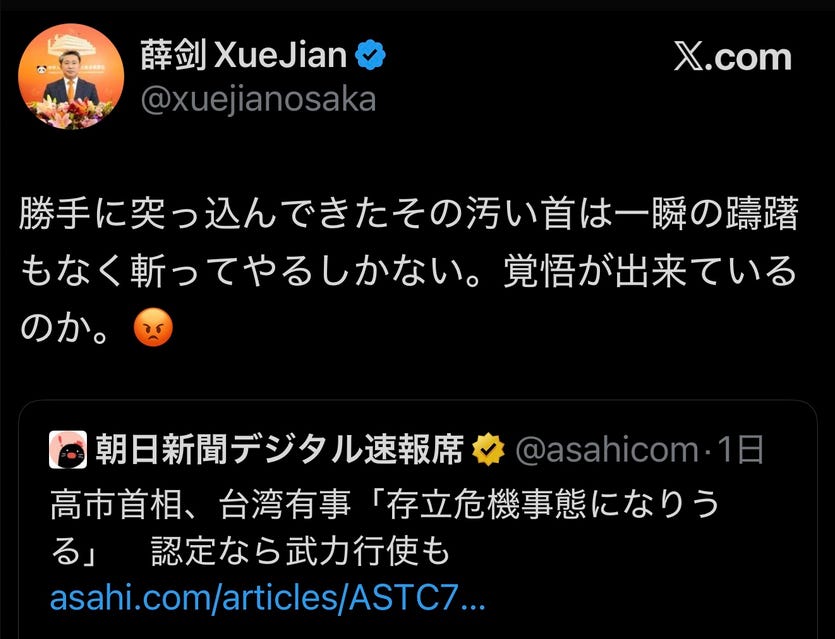This Relationship Will Get Worse
金門調酒 - Kinmen Cocktails #8
“We have no choice but to cut off that dirty head that has lunged at us without hesitation. Are you prepared?” These were the choice words of the Chinese Consul General in Osaka, Xue Jian. He deleted his post on X, but of course, the internet is permanent.
Xue was reacting to newly elected (in the National Diet) Japanese Prime Minister Takaichi Sanae’s comments to a parliamentary committee on Friday that a blockade of Taiwan would be a “survival-threatening situation for Japan.”
While this is not the first time Tokyo has made such a declaration, it is the first time that Takaichi has made such a statement to the Diet.
Most observers do not understand what the Japanese mean when they say “survival-threatening situation.” This is precise language that describes the Japanese Self-Defense Force’s authority to mobilize.
Under the Japanese constitution, the cabinet can determine a “survival-threatening situation for collective self-defense.” This would allow the Prime Minister to mobilize the JSDF and conduct combat operations.
Additionally, survival-threatening situations imply collective defense. Here, the Japanese are being ambiguous. Is Tokyo saying that Taiwan de facto falls under Japan’s collective defense umbrella? Or that Tokyo will trigger the bilateral mutual defense treaty with Washington and bring the US into the fight? Or both?
Asked for clarification of his remarks, Xue Jian said:
“I would like to reiterate that the root of the problem lies with the Japanese politicians who, disregarding our repeated and emphatic statements of opposition, casually and frequently declare that ‘a Taiwan contingency is a Japan contingency…[this claim would] surely constitute…[a threat of violence toward China.]”
The People’s Liberation Army (PLA), China’s military, follows a doctrine of active defense outlined in a 2019 PLA Defense White Paper, which states, “we will not attack unless we are attacked, but we will surely counterattack if attacked.”
Xue is suggesting that Japanese mobilization constitutes an attack against Beijing.
Putting the legalese into plain language is simpler. Tokyo says a blockade of Taiwan would trigger Japanese mobilization and calls for collective defense.
In response, Xue (not the central government in Beijing) retorted that Japanese mobilization (the dirty head lunging at Beijing) will be cut off. Essentially, Japanese mobilization would result in Chinese offensive strikes.
And we’re off to the races. National dialogues haven’t been like this since before WWI and WWII. Except in our modern times, Xue Jian used an angry emoji. May we live in interesting times.




Would be nice to see some payback for Nanking! Here’s hoping! 👍
WOAH